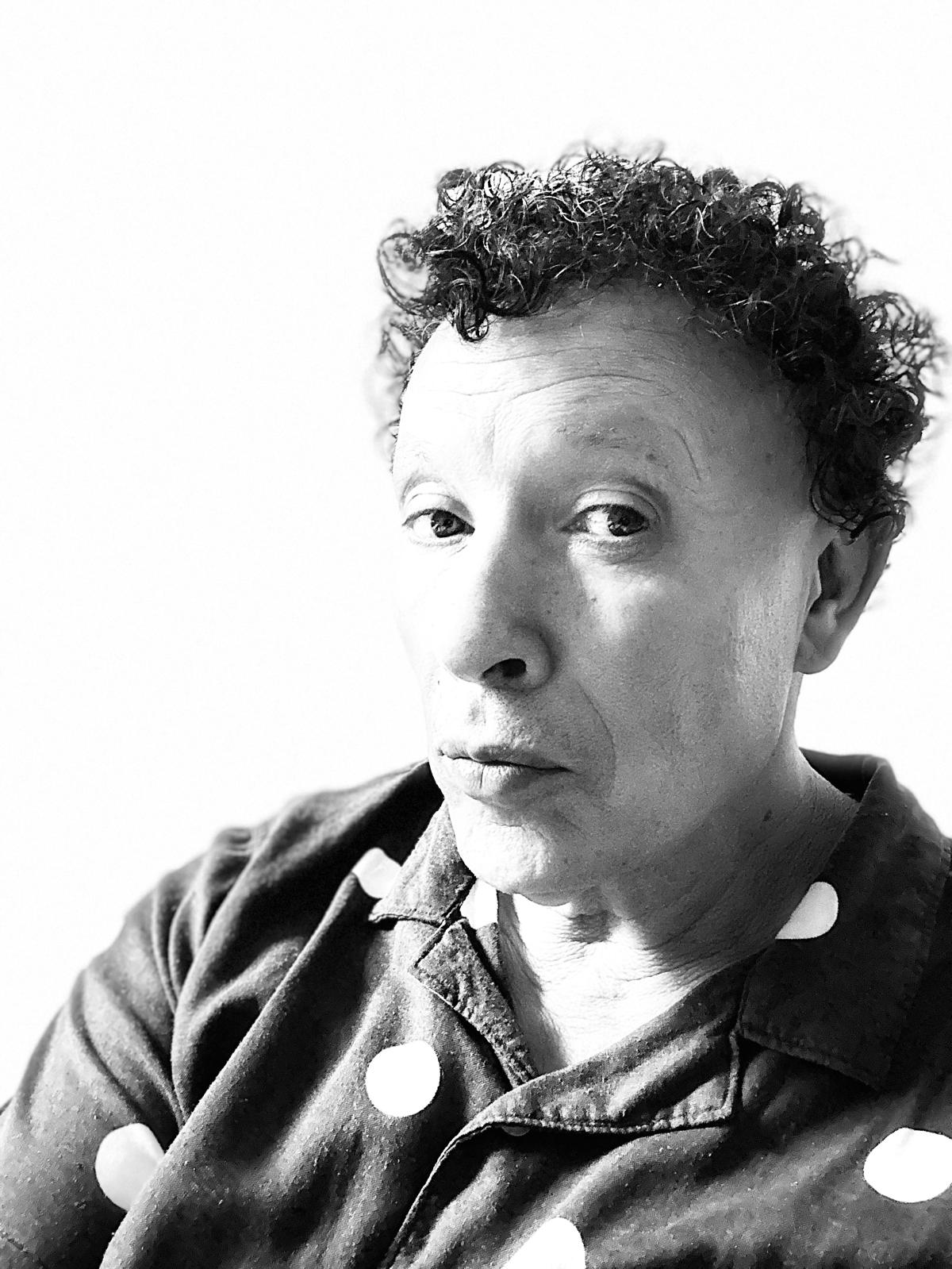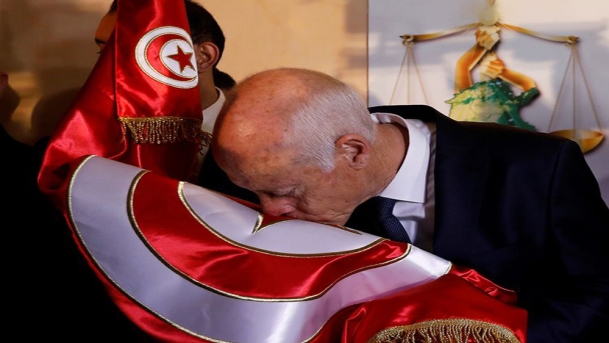
The election of retired constitutional law professor, Kais Saied, as Tunisia’s new president, has triggered a wide array of reactions and energized hopes for a promising Arab democracy at last. During his campaign as a low-profile candidate with no established political affiliation, he asserted, "I am independent and will remain so until the end of my life." Some analysts have paid close attention to the dialectic between the presumed ‘effectiveness’ of the political institutions and citizen participation. Saied’s presidential victory also implies several ironies in a country that symbolizes the cradle of the 2011 Arab uprisings, or so-called “Arab Spring”, where four civil society organizations were awarded the Nobel Peace Prize in 2015.
President-elect Saied’s status of a new political Rock star in both Tunisian and Arab contexts has nurtured optimism in the second wave of Arab democratization in the new millennium. In his acceptance speech, he thanked his young fellow citizens “for turning a new page” and vowed to try to build “a new Tunisia”. About 90 percent of 18- to 25-year-olds voted for Saied, according to estimates by the Sigma polling institute, compared with 49.2 percent of voters over 60.”(1)
In this paper, Dr. Larbi Sadiki, professor of international affairs at Qatar University and editor of the Routledge Handbook of the Arab Spring, examines the 2019 presidential elections as a reflection of a fragmented and changing political landscape in Tunisia. Fluidity of political parties and the rise of independent politicians has been a consistent trend since the 2011 revolution. He also probes into the enormous political challenges, including the formation of a coalition government notwithstanding, and argues, “socio-political marginalization, unemployment, steep public debt, and Tunisia’s security relations require not populist discourse but problem-solving leadership.”
Nearly nine years after the 2011 uprising, the revolutionary ethos appears alive and well in Tunisia. Voters issued a strong rejoinder to establishment politicians and parties, reminding observers and the political elite alike that freedom, dignity, and social justice remain unfulfilled aims. The 2019 presidential race was marred by accusations of corruption, incarceration of a frontrunner candidate, the return of some ancien regime figures, and expectations of voter apathy. This paper examines the unfolding of Tunisia’s democratic transition with special reference to the 2019 presidential (and to a lesser extent, parliamentary election). It begins with an overview of the crowded presidential field narrowed in the second round to a contest between newcomers Nabil Karoui and Kais Saied.
Proceeding to a critical assessment of the salient features of this election season, the paper then briefly examines the predicament of Ennahda in crisis. It concludes with a look ahead to the political and economic challenges facing a green President Saied with zero political experience, no political party to serve as the legislative counterpart to his agenda—and an enthusiastic youth cohort that has re-entered formal politics with a relish.
This significance of the 2019 election season goes beyond Huntington’s two peaceful transfers of power for consolidation of democracy (2) —a standard that Ennahda’s Rached Ghannouchi seems to have accepted in celebrating these elections as Tunisia’s democratic “graduation.” More importantly, perhaps, is the remarkable smoothness of the early elections brought on with Essebsi’s death. Much credit goes to the ISIE, the national election commission headed by Nabil Bafoon, for re-scheduling the presidential and parliamentary polls, even delaying the presidential runoff to ensure that Karoui was released before the runoff election on October 13th. Here is another “first” for the Arab world. Commentators across the Arab geography have been effusive in their admiration of Tunisia’s presidential-parliamentary-presidential election trilogy over the past few weeks, not least for its outcome that seems to have revived the revolutionary ethos and perhaps a faith in change-inducing democracy itself. (3) The moment of excitement may be short-lived. Very soon, the realities of governance will set in-- a fragmented Parliament in which cobbling together some sort of coalition, possible legal challenges from Karoui’s team, not to mention the daunting economic/development challenges that spurred this “protest vote” in the first place. Yet, it is safe to say that Tunisians have impressed once again.
The Race Begins in a Crowded Field
A brief comparative look is in order. At 55 percent, voter turnout may have been higher than expected but lower than the 60.1 percent of the second round of the 2014 presidential elections. Kais Saied’s vote share at 72.71 percent compared to Nabil Karoui’s 27.3 percent is as “landslide” as one can get, surpassing Essebsi’s 55.68 percent five years earlier that was closer to Marzouki’s 44.32 percent loss.
In a fragmented field of 26 (trimmed to 24) candidates, the 2019 presidential race brought with it the element of money and attendant drama. Football mogul Selim Riahi (owner of Club Africain), is dogged by questions over the source of his wealth. He dropped out of the race on the eve of the first round. The wealthy Nabil Karoui was from the offset serious competition for both Chahed and even, Ennahda thanks to his charity work with the marginalized in the country’s interior regions. The Nassma TV owner whose candidacy would have been denied had the modified election law that Sebssi failed to sign before his death gone into effect, was in custody from August 23 until 48 hours before the runoff on October 13, on charges of tax evasion and money laundering.
In a democratizing political system where judicial independence still leaves much to be desired, Prime Minister Chahed sounded disingenuous in his insistence that the arrest (duly condemned by fellow candidates) was not politically motivated. During the parliamentary campaign and into the second round of the presidential race, all candidates (except Chahed) called for Karoui’s release, seeking a more even-handed race. Whilst repeating “I am not in a race against anybody,” Kais Saied put his money where his mouth was, as it were, and suspended campaigning during the last week in solidarity with Karoui.
Abeer Moussi lost big in the first round of the presidential race, securing less than 5 percent of the vote. Yet this leader of the Free Dustour party made a dent on the election scene. She unabashedly hearkens back to the days of Ben Ali, she considers “revolution” a misnomer for the transformation set in motion in 2011. Moussi’s well-worn refrain of attacking Islamists (referring to Ennahda only as “al-Ikhwan”) as a putative threat to democracy and the Tunisian way of life, proved not to be her only campaign issue as she entered the parliamentary race. She adopted the language of development and responsiveness to citizens’ needs as indicative of failures by ruling parties and elites and the larger post-2011 “rotten” politics. Her Ben Ali affiliations and anti-revolution stances may have deterred most Tunisians—but not all, as evidenced by her party’s 17 parliamentary seats. She is sure to be a dogged naysayer, a persistent challenger to whatever coalition is hammered out.
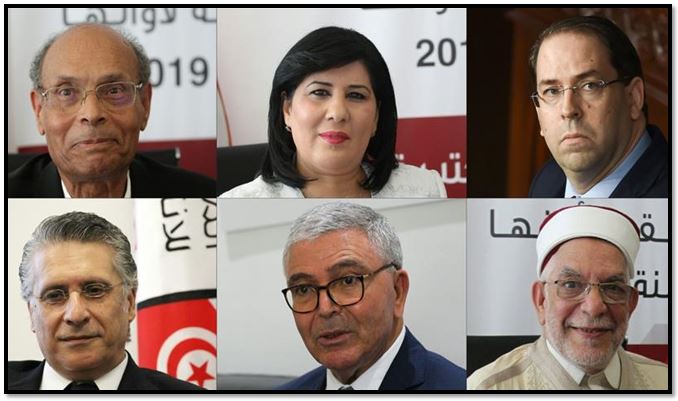 |
| Main candidates of Tunisia's 2019 presidential election [AFP] |
Another political newcomer was presidential candidate Saifeddine Makhlouf, spokesperson for Etilak al-Karamah (Dignity Coalition) of independents (including bloggers and academicians, etc.) and former post-2011 parties such as Justice and Development and al-Mu’tamar (Congress) parties. Despite his seeming overconfidence—Makhlouf failed to advance to the runoff. An attorney who has been something of a lightning-rod figure, deemed ultra-conservative by even Tunisian Islamist standards, ran on a platform of representing the “thawrah damir” (revolution consciousness) of the country to reclaim Tunisian dignity from the creeping security tentacles of the state and sovereignty compromised by outsiders. Too argumentative, perhaps, for a presidential personality in an increasingly fragmented country, Makhlouf has demanded an official apology from France for colonialism and continuing postcolonial exploitation (e.g. oil and other natural resource contracts, visa requirements into France or the EU for the matter, etc.). Even with his lost presidential bid, he remains on the political scene, as Etilaf al-Karamah has nabbed 21 seats in the parliamentary election.
Abdelkarim Zbidi, post-2011 defense minister (and former health minister under Ben Ali), might have been closest to the Western preference for leadership in Tunisia. He would have stood between the Islamists and key ministries, overseeing the intelligence and security portfolios in close contact with Western military and political elites. Yet he did not go far, coming in fourth with less than 10 percent of the vote.
Chahed, running on a “pragmatic” platform of anti-corruption and paying lip service to the untapped potential of the country’s (largely unemployed), restive youth, insisted that he will renegotiate Tunisia’s agreements with the EU. (He also promised to drop his French citizenship, per the constitutional mandate for presidential contenders, surprising Tunisians unaware that he has been a dual citizen all along.) Yet the candidate attempting to model himself after Bourguiba-era Prime Minister Hadi Noueira has over the last three years administered Tunisia’s $2.9 billion loan from the IMF, austerity strings attached. His unpopular policies have sparked recurring protests in the capital as well as the country’s West and South. Construction workers and doctors are the latest to threaten an impending strike. This record did not inspire confidence that he would reverse Tunisia’s descent into economic dependency, or limit profiteering by foreign corporations at the expense of local economic gains. His constant spouting of numbers (hundreds of thousands of families receiving aid from the state, a growth rate slowly inching toward 3percent ) did not mask the over 15percent unemployment rate in the country—more than twice that in some governorates and among youth— skyrocketing prices, and public debt that has soared to over 70percent .
Yet while he failed miserably in the presidential poll, his party Tahya Tounes’s 15 parliamentary seats, probably a surprise to many, are nothing to sneeze at. Whether or not he joins the Ennahda-led coalition remains to be seen. But the 43-year old’s is ambition does not appear to have been dampened. He is not yet done with Tunisian politics, even having the gall to comment on KS’s win as proof that Tunisians are sick of “corruption”: his pet issue that landed Karoui in jail in the first place, to much criticism. Chahed does not seem to recognize that he was part of what Tunisians voted against –indeed, head of that very government!
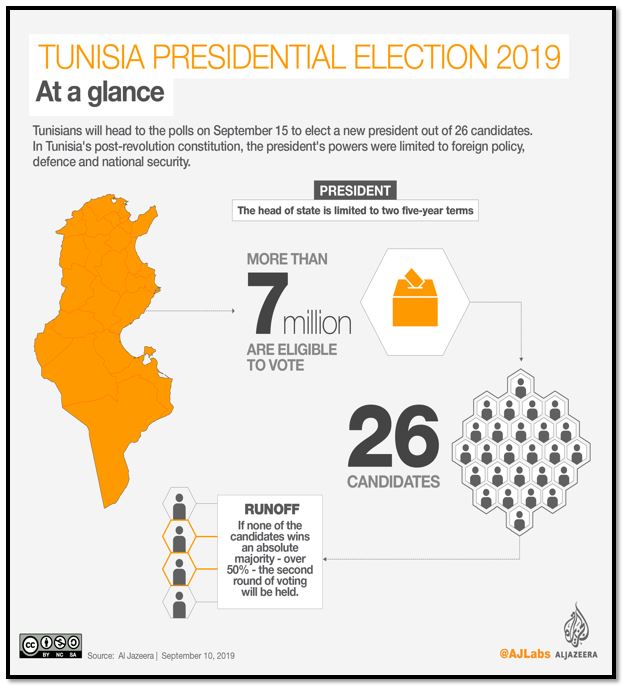 |
| Tunisian's political landscape in 2019 [Aljazeera] |
Candidates Under the Spotlight
The role expected of the local media in voter education and dispassionate and ‘neutral’ information of the public leave much to be desired in Tunisia. The media scene has definitely been enriched by privatization, decreased concentration and proliferation. (4) However, the notion of ‘authoritarian resilience’ (5) is not far-fetched when making the case of congruence, or lack thereof, between media development and democratic transition. Nessma TV of billionaire (and 2019 presidential contender) Nabil Karoui, Hannibal TV (formerly owned by businessman Larbi Nasra, an independent presidential candidate) and especially Zaytouna TV tended to side with the Islamist Ennahda Party (often written Ennahda). To an extent, this polarizing role of media continued in the 2019 elections, in both presidential and parliamentary elections, with candidates planning their appearances according. Nessma TV’s media “voice” was unsurprisingly partisan. It maintained clear solidarity with its owner Karoui after his arrest, including through appearances by his wife Salma Smaoui.
At the same time, in line with directives by the High National Independent Authority on Audio-Visual Communication (HAICA), TV and radio stations alike attempted to offer equal media time to presidential candidates through the 2019 election season. This included not just TV stations (Al-Tasi’ah and Al-Tunissia, etc.) but also radio. MozaiqueFM, ShamsFM, and others took turns hosting each candidate, also extending invitations to Karoui’s campaign when the Nessma owner was in jail. The country’s youth, however, swiftly mobilized to decry instances of one-sided TV coverage. Fierce attacks on Kaiss Saied aired on TV channel Al-Hiwar al Tounsi, for example, prompted a social media campaign and a million un-subscriptions from its Facebook page. (6)
The highlight has been the presidential debates (7), to which millions of Tunisians tuned in. During the first round, they were broadcast three nights in a row (September 7-9) to account for all initial 26 candidates. (8) Substantively, questions addressed security and national defense, foreign policy, and a range of “public issues” from gender equality to economic woes facing citizens. This series of debates, a first for the Arab world, provided a welcome opportunity for voters (and other Arab observers, who may have followed with admiring interest) to view up-close the respective personas of the presidential hopefuls. This “test” of candidates’ improvisational skills, including the ability to construct pithy, responses in the 90 seconds allotted was a chance for candidates to declare their stances on various political issues, some controversial (relations with Syria or the EU, inheritance laws).
Other issues and positions revealed more commonalities than differences between the candidates (“economic diplomacy” and the imperatives of regional development). The hosting duos (a man and a woman, from the public and private media sectors) of each debate competently ensured candidates followed the rules, stuck to the allotted time, and more or less engaged in respectful, if not particularly incisive, dialogue between the candidates. (A brief incident of “cheating” by two candidates who brought in forbidden supplementary materials—a notebook and a phone-- in the second debate, while surprising, did not much upset the equanimity and seriousness of this novel deliberative platform.)
The final debate, between Nabil Karoui just released from jail and Kais Saied, may or may not have been a decisive factor assuring the latter’s landslide victory less than two days later. The moderators’ questions could have been more hard-hitting in this final showdown between the final two presidential hopefuls instead of recycling questions from the first round of debates. They could have asked pointedly how each of the two candidates, for instance, could bring Tunisians together in a highly polarized climate with no clear winner after the parliamentary elections. It would have been the opportunity to press candidates on the gap between ambitious pledges (Saied’s “empowering the people” or Karoui’s “caring for the poor”) and narrow constitutional terms of reference allotted to the president. Still, the debates have been a positive step toward the constructive public deliberation that complements formal institutional processes in a democracy. Learning is ongoing: the performance of both moderators and candidates will likely improve with time.
The debate did, however, bring to the fore differences between the two personalities and some of their policy inclinations. It left a perhaps indelible impression of an eloquent, commanding, honest Saied (indirectly) sparring with a soft-spoken, relatively inarticulate Karoui. Failing to convince in his denial of hiring a PR firm run by an ex-Israeli intelligence officer, the media magnate waffled on the question of “normalization” with Israel.
1. Party Fluidity:
The 2019 elections sustained the continual change of the political party landscape begun five years earlier. In the 2014 elections, the bulk of the political parties or alliances that contested the 2011 NCA election dissolved. It is no surprise, then, that in 2019, the voting public took the two largest parties, Ennahda and Nidaa, to task for their “consensus” coalition. Throughout the 2019 campaigns, Ennahda and Chahed played the blame game for the failures of the tawaafuq in dealing with chronic unemployment and underdevelopment. Ennahda is alone in having withstood the party meltdowns of the other post-2011 parties. Still, it not only failed to advance its candidate to round two of the presidentials, but has also been largely diminished in the parliamentary elections. Nidaa Tounes has been buried with its founder Essebsi, its members redistributed into a number of spin-off parties including Yousif Chahed’s Tahya Tounes. Remnants of the Tunisian left, including Hammami’s Popular Front, have been all but scattered to the wind. This may be a post-ideological moment, albeit dizzying in its fragmented uncertainty.
2. Political Gentrification Rebuffed:
Moneyed elites are not specific to the Arab Middle East. They influence politics globally, as demonstrated in one study on Southern American transition. (9) Like Slim Riahi in the 2014 elections, businessman Nabil Karoui had a finger in every pie in 2019. The presidential election was only one front, as his new Qalb Tounes party came 2nd in netting 39 seats for parliament. Such a phenomenon, the nexus of politics and wealth in party formation, is deserving of systematic study. This quasi “gentrification” of politics in Tunisia has come under close scrutiny. For critics, it can undermine the country’s transition. (10)
One observation to be made here is that public disaffection with political parties in general may explain the rise of independent candidates whose share of the vote in the municipal elections of 2018 rose markedly. (11) The 2019 elections cemented this trend. Yet tycoons who have run for the presidency since 2011 have not succeeded, so far. Perhaps buying votes does not work. Karoui embraced the cheeky moniker “Makrona” (pasta) during his post-defeat press conference. Defiant, he noted that his opponents’ use of the label to poke fun at him and his party left him unfazed: Qalb Tounes cared about the poor. Tunisia would be a much better place if everyone received a plate of macaroni, insisted Karoui.(12) But voters in the second round appear not to have concurred, pointedly turned away from big money and the stench of corruption—whether campaign or vote buying. Instead, they opted for a candidate who spent no money campaigning, awarding Saied with nearly three times as many votes as the man who owned a TV channel and spent three years working with the poor as a springboard for his presidential bid. What does that say about oligarchy and democracy? (13) Perhaps newly democratized, developing countries are not necessarily doomed to choose the Berlusconis and the Trumps of this world--an important lesson worth pondering.
3. Ennahda in Crisis?
The Islamist Ennahda can rightfully claim an instrumental role in Tunisia’s post-revolutionary transition. It relinquished power once the constitution was adopted by the NCA in January 2014 and again in October 2014. The moderate Islamist party displayed willingness to concede defeat. This boded well for the future of democratic transition in Tunisia. (14) It is through the repeat of these exercises of consolidation of self-enforcing rules of competition and compliance that democracy is gradually constructed. Thereafter, five years of Ennahda’s tawafuq (consensus) with (former) rival Nidaa, hailed by so many including Western onlookers, may have ensured some modicum of stability within government. However, to what end? As it governed alongside Essebsi’s party under Prime Minister Chahed, Ennahda failed to rise to the policy challenges, namely the dire economic situation. Its convergence with (or capitulation to) Nidaa on such issues as the so-called Reconciliation Law (15), and austerity measures and tax hikes (16) incited public dissatisfaction as expressed through protests and campaigns such as Manish Msameh (I am not forgiving).
Thus, for the country’s best organized political party known for its fixed base (usually estimated at about 35 percent), Abdelfattah Morou’s failure to advance in the elections should come as a piercing wake-up call. The outcome forces questions about voting discipline within EnEnnahda. The myth of a united and coherent movement-party has been shattered. Endorsing Kais Saied in the second round, Ennahda soon jumped back on the “revolutionary” bandwagon as it campaigned for parliamentary seats. The party’s 52 seats in parliament (down from 69 in 2014) only confirmed sinking faith in Ennahda. It has the biggest share of Parliamentary seats, but nothing close to forming a government.
The party’s leadership should take this electoral beating as an opportunity for deep soul-searching. After Morou’s loss, Ennahda’s founding duo in particular should have seized the moment to themselves accountable to the party’s members, to its base, to all of Tunisia. They did not. Instead, Ghannouchi sought to make up for years of empty “consensus politics” by invoking regional inequality, economic development, and the unemployment crisis in two weeks of parliamentary campaigning. But, the Tunisian public appears to have recognize the difference between delayed rhetoric and actual policy-making. So, they punished Ennahda, as they punished the rest of the political establishment. What saved Ennahda from being completely buried, like Nidaa and the other post-revolutionary parties that preceded it, was its relatively stable base over the last eight years. Yet, it is now a much-diminished political force. This phenomenon is both fragmentary but, concomitantly, a pluralizing dynamic. Nonetheless, for the Islamists, much reflection is in order.
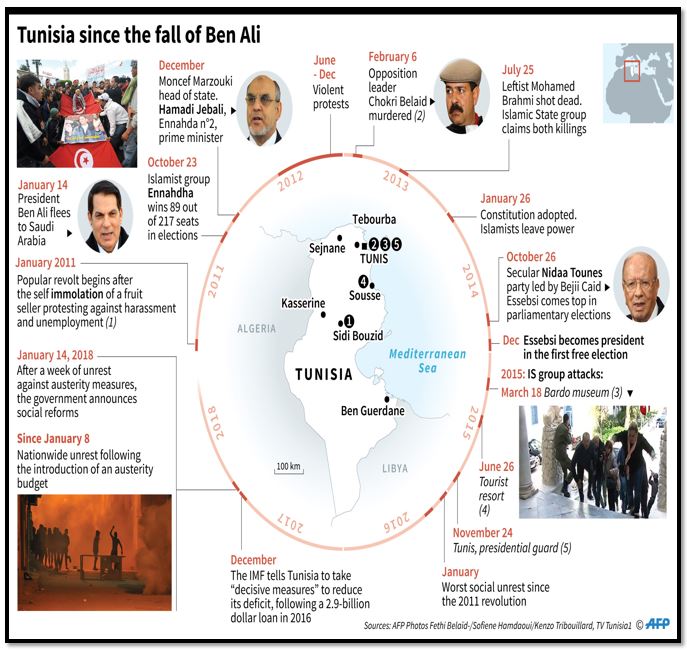 |
| Tunisia since the Fall of Benali [AFP] |
What has Ennahda offered to Tunisians since their crowning achievement, five years ago, of helping hammer out the constitution of the second republic? When Ennahda joined hands with Essebssi and came up with its “consensus” innovation, did the party downsize itself? The question now for the party is this: is its entire project a failure, sunk by the Tunisian electorate? Or is the alternative narrative, of tactical and strategic mistakes in a poorly administered “consensus” between two men and not their parties, its content never documented or publicized and thus subject to political scrutiny and deliberation (17), convincing? Many saw this election season as the time for Ghannouchi to make a graceful exit from politics, especially after Morou failed to advance to the second round of the presidential. Handing over the party’s leadership to the younger generation is long overdue.
Yet the Shaykh appears not to have heeded dissenting voices, within Ennahda let alone the larger Tunisian population. Ghannouchi as Prime Minister (if one goes by the rumour mill of late) seems a dubious political arrangement when Ennahda is in the throes of an existential and identity crisis. For five years it was neither majority party, nor opposition, nor, since 2016, political Islam. Eight years after the revolution, who is Ennahda? The next five years will be full of trial and error. With no formal political experience, Ghannouchi’s rumored venture into the premiership will be deleterious not only to the country, but also to his own political legacy-in-the-making.
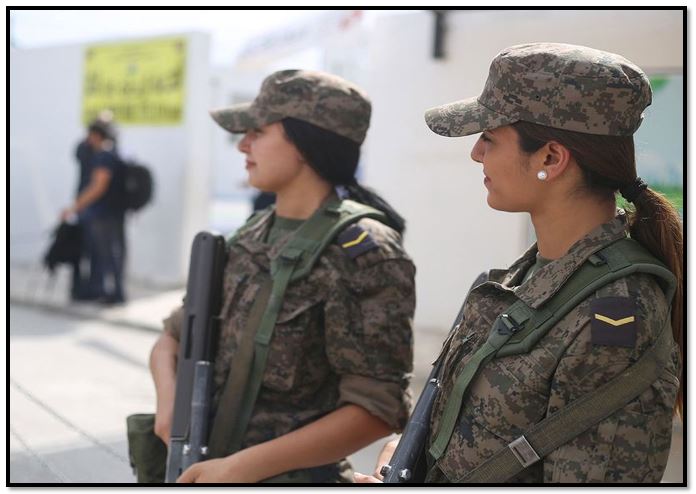 |
| Women soldiers stand guard outside a polling station during a second round runoff of the presidential election in Tunis, October 13, 2019. [Reuters] |
Conclusions: Democratic Learning in Challenging Times
As was the case in 2014, the main democratic acquisition has been the consolidation of free elections as a foundation for constitutional, orderly, non-violent, periodic and rule-based alternation of power. The practice, regardless of who emerged on top in the landmark election, is key to democratic learning. (18) Ennahda and Nidaa Tounes thus set the scene for a process of quasi electoral ‘habituation’ by minor political parties’ alliances and their followers. In this regard, the skills to generate information, partisan propaganda, campaigning, media management, and connecting with the public are all newly acquired skills that were on full display during the 2014 election, and again in 2019. The fact that Tunisian political parties and elites (new and old) play by the rules of the democratic game is a strong indication of a level of ‘civic’ maturity allowing for electoral rules to be enforceable. Compliance with electoral rules and results is integral to the understanding of democracy and democratization across a wide body of democratic theory. (19) In 2019, it is safe to say that voting has become routinized political practice, even if only among 55 percent of eligible voters. The revolution has struck back, yes, but through the ballot box.
The Puzzle of Kais Saied
A historic victory in the 2019 presidential election has raised the youth's hopes of reclaiming a margin of existence, and a space for rekindling the memes of the 2011 revolution, namely, “the people want”. As a result, all eyes are now focused on how the youth’s chosen supposed savior, KS, will translate this slogan into freedom, dignity, and above all else, jobs. The country’s youth have made an about-face from their political apathy documented in the years since the revolution. (20) Young people have proven that they not only protest and work in civil society, but also vote. Exit polls have estimated that 90 percent of 18-35 year-olds, and 83.3 percent of 26-44 percent, cast their vote for Saied. (21) For many youth, the choice was between decency, integrity, honesty (Saied) and corruption (. Karoui). Saied inspired youth voluntarism as well as formal political participation, getting the revolution back on track, in some accounts. (22)
However, the twist in this story is that how is this going to mark a "turning point" for the KS’s constituency when economic management does not constitutionally come under the purview of the president’s duties. Despite this election's hype and victory of a “clean” and non-establishment figure, however, the question of how a president restricted constitutionally to foreign affairs and security is going to please his voters will remain shadowed in uncertainty. Further complicating the upcoming president is the future influence of the amorphous non-partisan youth movement (hirak) that helped KS in the runoff vote of October 13 against NK. It should be noted that this youth hirak rebelled not only against Ennahda whose “defectors” helped vote KS into office, but also against the entire establishment that has run the show since the October 2011 National Constituent Assembly elections. There is an element of protest movement against parties and leaders, which the voting public deems to have strayed from the principles of the uprisings. That backlash not only explains the dramatic results during the 2019 elections, legislative and presidential, sweeping away entire establishment organizations — including from within the left, the biggest loser in these elections — in favor of unknown parties and candidates who could claim affinity with Tunisia’s “indignants”.
How has an unconventional populist (23) who makes up for his lack of political establishment identity or anti-authoritarian struggle, (24) with fervent grassroots backing won the presidential race? An examination of the context and the dynamics of the country’s polity suggest that what helped KS defy conventional wisdom about Tunisia’s 2019 contest are lingering problems ignored over 8 years by inexperienced and power-focused political forces and leaders. Here is a far cry from Mohammed Morsi’s victory (51.7 percent) over the Mubarak-affiliated Ahmed Shafiq (48 percent). (25) Kais Saied’s candidacy was more an outlet for people to vent their political disillusionment. His 72 percent share of the vote is not a political barometer. Instead, the first round results where Saied was allotted 18.4 percent of the vote share and Karoui 15.58 percent, with Ennahda’s Morou coming in third, offer a more accurate snapshot, as confirmed by the parliamentary elections where no party even approached a majority. Tunisia’s political mosaic is far from monism. Thus Saied’s overwhelming majority should not be flagged as a test of popularity. He was democratically elected as the polity finds itself at a kind of nadir. At judgement day, Tunisians handed down a sentence to the post-Ben Ali establishment, including Islamists. How someone party-less, political base-less finds himself in high office is a political puzzle that will be unfurling over the next five years.
Most striking about Saied is his “contre-pouvoir”, anti-system sensibility. Yet, he himself ran for office, clearly not opposed in principle to the democratic attainment of power. Saied was at his most fiery in the presidential debates, railing against the “high treason” of dealing with the Zionist state—and not Jews as such--that had “displaced [the] entire [Palestinian] people…many of whom remain in tents today.”(26) In this exchange he was also at his most populist, sounding more emotive and ideological than presidential in proclaiming that war was the “normal” state of affairs with Israel. It is one thing for celebrating crowds to shout “the people want a free Palestine!” The formal discourse of a presidential candidate or president should sound more sophisticated. Saied could have offered a more credible position through a legal-juridical take on the “Deal of Century” by stressing, for instance, a prioritization of Palestinian interests in line with international law and UN Security Council Resolutions. He purports to be, after all, upholder and respecter-in-chief of sovereignty and legality. His political lexicon remains wanting, a deficiency that some political experience and reflexivity may remedy.
This populist discourse invoking the “general will,” however, is anachronistic at best. Whose popular will? Over two hundred years of democratic theory and practice across the world have problematized a single, spontaneous iradah ‘ammah. Why attempt to overhaul the country’s constitution that Tunisians deliberated on for four years, in pursuit of a new political system (“from the local to the regional to the center”) approximating direct democracy, complete with recall mechanisms? (The constitution itself sanctions and potentially empowers local and regional governance. The problem has not been just implementation and a lack of political will, but also a dearth of public funds.) Informal actors (activists, politically unaffiliated youth, unions, etc.) must be included in policy planning, not least of which in the realm of development. Yet the aim is not to make unofficial actors and processes fully institutionalized. Especially Tunisia’s civil society infrastructure is unique in the Arab world for its development. Tunisia’s constitution-making and its Nobel Quartet comes to mind.
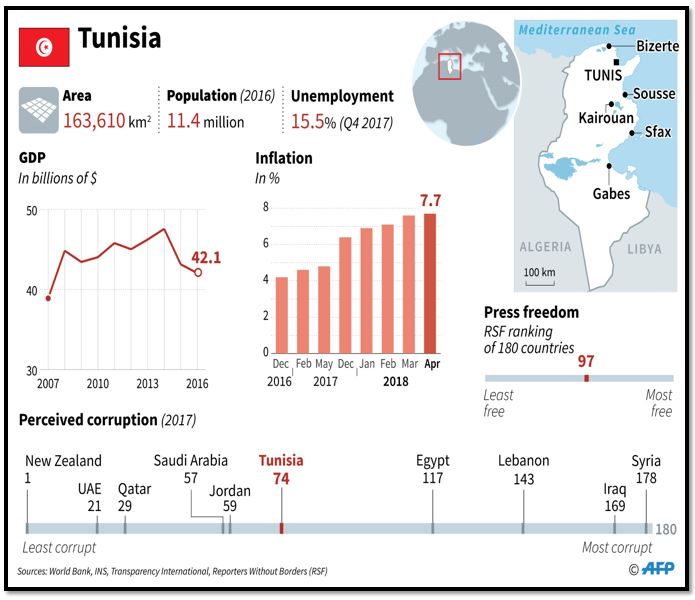 |
| Tunisia’s economic indications [AFP] |
Saied is right to note that political (and not just economic) marginalization of youth in particular is a glaring deficiency in a country whose political establishment has veered off the revolutionary track. Yet his promise to “empower the people” especially the youth to “rise to the level of decision-making” to implement their own will smacks of digression from real issues. He has offered very few concrete solutions to reviving the ailing economy. Talk of a greater “social role” for the state a la 1960 may sound appealing. But that was nearly six decades ago, before Bourguiba’s turn to liberalization secured by Bin Ali, before the IMF was breathing down Tunisia’s neck demanding more austerity and fiscal discipline, before unemployment reached over 30 percent in some regions, before the return of harqa (illegal boat migration) as a dystopian dream for hopeless youth. Wherever Tunisia’s elites turn, they are plagued by the unrelenting problem the solution of which exists in the country’s political repertoire, identified by Bourguiba himself: al-tanmiyah al-jihawiayyah (regional development). There is no need to reinvent the wheel, merely to offer leadership on creative yet feasible solutions.
To translate his promise to empower the people (esp. the youth) into actionable policies, why not pick the brains of those who work for UN MDG (millennial development goals 2000l2015/2030), eg., encouraging the youth to teach for Tunisia and then reward those who did with seed money for starting up small businesses, selecting volunteers to be grass-roots ambassadors to Mediterranean nations to promote Tunisian products (including cultural products). No need to re-invent the wheel to enregise employment: just leaders ought to look up to Asian small credit experiences and taking stock from Morocco’s successful promoting of its products worldwide and its tourism, and from Egypt’s employment of its nationals in international organizations.
Looking Ahead
Certainly, the political challenges and economic woes facing Saied are daunting. (27) But fragmentation need not be a death-sentence; it can be productive. Sustainable democratization feeds on pluralism. It is far better than party hegemony. Diversified governance means more partners, more ideas, and dispersed responsibility and power. If Ennahda loses more seats in the next parliamentary election, that may bode well for Tunisia’s sustainable democratization. Tunisia’s sustainable electoral contests have been turned into tests of democratic consolidation and learning processes. Through these processes the Maghrebi country of under eleven million people is progressively building civic capital and its young people are engaged in democratic learning. As a resource-poor country, Tunisia can capitalize on its fledgling democracy (28) to become an Arab leader in developing holistic policies that promote sustainable democracy in scape with both global and local standards. (29) Its incipient entry into the international “democratic club” is a golden opportunity to cultivate diplomatic, economic, and even cultural relations with other democratic countries. Such confidence and capacity building will allow Tunisia to shine in international organizations (including but not limited to its temporary Security Council seat in 2020) to become a highly respected global citizen amongst the community of nations.
Thorny foreign policy issues face an incoming president. How will Kais Saied’s populism face real-world problems like post-2011 US military operations out of the country’s bases with little to no information-sharing with the Tunisian government, let alone oversight? (30) Will this defender of international sovereignty continue counter-terrorism cooperation—much of it kept secret for its undoubted unpopularity among the public--with the Americans (e.g. US drones in the Bizerte air base, or US Marines operations) (31) begun in 2014? However, the question remains whether its sustainable democratization would translate into inclusive economic growth and regional development. For sustainable democratization to be converted into a resource, policies and tangible programs geared towards welfare of all citizens must form a priority for the newly elected leaders and people’s representatives.
After making good on his promise to visit Algeria, Kais Saied should also travel to neighbouring Morocco. Islamists (including Ennahda) have long flocked to Paris and Washington, D.C. on official visits. For inspiration, Saied can break this mould and make trips to fellow small states Singapore (32) (impressive in developing a knowledge economy , with its National University ranking 22nd in the world (33) ) and Costa Rica (34) (with more than six decades of experience with democracy, “despite” its relative poverty). Like Tunisia, these countries are resource-poor but human capital-rich, success stories in refashioning their politics in a way that enabled them to provide for their peoples.
Advancing citizen welfare may be the solution for increasing productivity, which is badly needed for enhancing wellbeing, eradicating marginalization, (35) alleviating poverty, and creating jobs. Failing this, would render sustainable democratization Tunisia’s kind of ‘resource curse”. That is, a country endowed with an expanding civic capital and democratic learning but unable to make effective use of its democratic resource. The past eight years elected governments and parliaments in Tunisia have labored under the duress of corruption, poor rates of economic growth, a devalued Dinar, polarization, high unemployment and soaring public debt of over 70 percent (36), including dependence on international lenders.
Democracy may not reverse corruption fully, but it furnishes the legal means of reducing it. It may not be a panacea for all ills, but it builds the civic and democratic capital needed for unleashing initiative consistent with improved social and distributive justice, regional development, and wider scope for economic growth.
-
Michael Safi, “Tunisia election: 'Robocop' Kais Saied wins presidential runoff”, The Guardian, October 14, 2019 https://www.theguardian.com/world/2019/oct/14/tunisia-election-exit-polls-point-to-landslide-win-for-robocop-kais-saied
-
S. Huntington (1992), Third Wave: Democratization in the Late Twentieth Century. (Norman: University of Oklahoma Press), p. 266.
-
Ayesh, M (2019), Shukran Tunis. Al-Quds al-Arabi, 14 October. Available from: https://www.alquds.co.uk/%D8%B4%D9%83%D8%B1%D8%A7%D9%8B-%D8%AA%D9%88%D9%86%D8%B3/ [Accessed 16 October 2019.]
-
R. Haugbølle & F. Cavatorta (2012): “Vive la grande famille des médias tunisiens’ Media reform, authoritarian resilience and societal responses in Tunisia,” The Journal of North African Studies, (2012) Vol. 17, No.1, pp. 97-112.
-
A. J. Nathan, ‘Authoritarian Resilience,’ Journal of Democracy, (2003) vol. 14, no. 1, pp. 6-17.
-
UltraSawt, 18 September 2019, Rafdah li 'tashwih' Kais Saied: Himlah 'Faisbookiyyah' Dhid Qanat 'Al-Hiwar al-Tounsi.' Available from: https://ultratunisia.ultrasawt.com/%D8%B1%D9%81%D8%B6%D9%8B%D8%A7-%D9%84%D9%80%D8%AA%D8%B4%D9%88%D9%8A%D9%87-%D9%82%D9%8A%D8%B3-%D8%B3%D8%B9%D9%8A%D9%91%D8%AF-%D8%AD%D9%85%D9%84%D8%A9-%D9%81%D9%8A%D8%B3%D8%A8%D9%88%D9%83%D9%8A%D8%A9-%D8%B6%D8%AF-%D9%82%D9%86%D8%A7%D8%A9-%D8%A7%D9%84%D8%AD%D9%88%D8%A7%D8%B1-%D8%A7%D9%84%D8%AA%D9%88%D9%86%D8%B3%D9%8A/%D8%A7%D9%84%D8%AA%D8%B1%D8%A7-%D8%AA%D9%88%D9%86%D8%B3/%D9%85%DB%8C%D8%AF%DB%8C%D8%A7/%D8%A7%D9%94%D8%AE%D8%A8%D8%A7%D8%B1 [Accessed 17 October 2019].
-
Al Jazeera, Ma Dawr al-Munadharaat al-Tilfizyooniyyah fi al-Intikhabaat al-Ri'aasiyyah al-Tunisiyyah? 14 October. Available from: http://mubasher.aljazeera.net/news/%D9%85%D8%A7-%D8%AF%D9%88%D8%B1-%D8%A7%D9%84%D9%85%D9%86%D8%A7%D8%B8%D8%B1%D8%A7%D8%AA-%D8%A7%D9%84%D8%AA%D9%84%D9%81%D8%B2%D9%8A%D9%88%D9%86%D9%8A%D8%A9-%D9%81%D9%8A-%D8%A7%D9%84%D8%A7%D9%86%D8%AA%D8%AE%D8%A7%D8%A8%D8%A7%D8%AA-%D8%A7%D9%84%D8%B1%D8%A6%D8%A7%D8%B3%D9%8A%D8%A9-%D8%A7%D9%84%D8%AA%D9%88%D9%86%D8%B3%D9%8A%D8%A9%D8%9F [Accessed 17 October 2019].
-
Shorouk News (2019), Munadharaat al-Ri'aasah fi Tunis: Dimuqratiyyah Haqiqiyyah am Mujarrad Minassah Khitabiyyah? 9 September. https://www.shorouknews.com/news/view.aspx?cdate=09092019&id=fccb5a8c-2e6f-4873-8c8a-2bb3ebc6c6b4 [Accessed 18 October 2019].
-
W. Nylen, (2003). Participatory democracy versus elitist democracy; Lessons from Brazil. (New York: Palgrave Macmillan).
-
David Kirkpatrick, “Financing questions shadow Tunisian vote, first of Arab Spring,” New York Times, 22 October 2011, in: https://www.nytimes.com/2011/10/23/world/africa/tunisia-election-faces-financing-questions.html, (Accessed: 15/11/2014).
-
Tarek Amara, "Independent Candidates Get Most Votes in Tunisia's Municipal Election." Reuter, s, 8 May 2018, https://www.reuters.com/article/us-tunisia-election/independent-candidates-get-most-votes-in-tunisias-municipal-election-idUSKBN1I92DW, (Accessed: 1 August 2018).
-
Mosaique FM (2019), Madha Qaala Nabil Karoui 'an Fawz Kais Saied? 14 October. Available from: https://www.youtube.com/watch?v=UmIJvwb9dUg [Accessed 17 October 2019].
-
ArabiPress (2018), Kutub Ahmad Nadhif: Tunis: Dimuqratiyyah Tahta Sultat al-Mal, 26 December. http://arabipress.net/?page=article&id=45136 (Accessed 17 October 2019).
-
Al-Jazeera, “Tunisian PM Resigns as part of Transition Plan,” 9 January 2014, http://www.aljazeera.com/news/middleeast/2014/01/tunisia-pm-resigns-as-part-transition-plan-201419145034687910.html, (Accessed: 20 June 2014).
-
B. Barakat (2017), Tadhahura fi Tunis Rafdan liqanun al-Musalahah wasata Tabayun Mawaqif al-Ahzab. Alaraby Aljadid, 16 September. Available from: https://www.alaraby.co.uk/politics/2017/9/16/%D8%AA%D8%B8%D8%A7%D9%87%D8%B1%D8%A9-%D9%81%D9%8A-%D8%AA%D9%88%D9%86%D8%B3-%D8%B1%D9%81%D8%B6%D8%A7-%D9%84%D9%82%D8%A7%D9%86%D9%88%D9%86-%D8%A7%D9%84%D9%85%D8%B5%D8%A7%D9%84%D8%AD%D8%A9-%D9%88%D8%B3%D8%B7-%D8%AA%D8%A8%D8%A7%D9%8A%D9%86-%D8%A7%D9%84%D8%A3%D8%AD%D8%B2%D8%A7%D8%A8 [Accessed 17 October 2019].
-
Amara, T. (2018), 'Violent protests resume in Tunisia after two days of calm', Reuters, 14 January. Available from: https://www.reuters.com/article/us-tunisia-protests/violent-protests-re… [Accessed 17 October 2019].
-
BBC News (2019), Abdelfattah Morou Yantaqid Al-Siyasah fi Tunis Qabla al-Intikhabat al-Ri'asiyyah, 10 October. Available from: https://www.youtube.com/watch?v=a5Myyv3g3m4 [Accessed 14 October 2019].
-
Sadiki, L. (2015), ‘Towards a “Democratic Knowledge” turn? Knowledge production in the age of the Arab Spring’, The Journal of North African Studies, 20:5, pp. 702–21.
-
Przeworski, (1991). Democracy and the Market (Cambridge: Cambridge University Press).
-
Yerkes, S. (2017), 'Young people are staying away from Tunisian politics--here's why,' Brookings Markaz Blog, 20 March. Available from: https://www.brookings.edu/blog/markaz/2017/03/20/young-people-are-staying-away-from-tunisian-politics-heres-why/ [Accessed 16 October 2019].
-
Kadarah, O. (2019), Al-intikhabaat al-Ri'asiyyah: Limadha Sawwata al-Shabab al-Tounsi bikathaafah li Kais Saied? France24, 15 October. Available from: https://www.france24.com/ar/20191014-تونس-الشباب-انتخاب-قيس-سعيد-رئاسة-الثورة [Accessed 17 October 2019].
-
M Tunisia TV (2019), Birnamij al-Hadath Dawr al-Shabab fi Hamlat Kais Saied wa Himayat Mashroo'ih, 17 October 2019. Available from: https://www.youtube.com/watch?v=MxrzYGbjP1U [Accessed 17 October 2019].
-
Baker, P. C. (2019), ' "We the people": the battle to define populism', Guardian, 10 January. Available from: https://www.theguardian.com/news/2019/jan/10/we-the-people-the-battle-to-define-populism [Accessed 18 October 2019].
-
Marzouki, M. (2004), 'An Ayyati Dimuqratiyyah Tatahaddathun? Paris: Al-Mu'assasah Al-Arabiyyah Al-Orubbiyyah lil Nashr.
-
The Guardian (2012), 'Muslim Brotherhood's Mohammed Morsi wins Egypt's presidential race,' 18 June. Available from: https://www.theguardian.com/world/middle-east-live/2012/jun/24/egypt-election-results-live [Accessed 17 October 2019]
-
Watania Replay (2019), Al-Munadharah al-Intikhabiyyah al-Ri'asiyyah lil Dawr al-Thani, 12 October. Available from https://www.youtube.com/watch?v=i0BSQB2NkM0 [Accessed 13 October 2019].
-
Al-Ramdani, M., ed. (2017), Masaar lil Intiqaal al-Dimuqrati al-'Aseer fi Tunis. Cairo: Cairo Institute for Human Rights Studies.
-
Al-Hnashi, A. (2018), Al-Din wal Siyasah fi Tunis wal Fadaa' al-Magharibi: Bayna al-Irth al-Tarikhi wa Ikrahat al-Waqi’. Tunis: Sotumedia.
-
El Dahshan, M. (2012), 'Tunisia stakes a claim.' Foreign Policy, 21 May. https://foreignpolicy.com/2012/05/21/tunisia-stakes-a-claim/ [Accessed 17 October 2019].
-
Jebnoun, N. (2017), Tunisia's national intelligence: why "rogue elephants" fail to reform. Washington, D.C: New Academia Publishing, pp. 64-5.
-
Blaise, L., E. Schmitt and C. Gall (2019), 'Why the U.S. and Tunisia keep their cooperation secrete,' New York Times, 2 March. https://www.nytimes.com/2019/03/02/world/africa/us-tunisia-terrorism.html (Accessed 17 October 2019)
-
Won, P., Y. Ho and A. Singh (2007), 'Towards an 'enterprenurial university' model to support knowledge-based economic development: the case of the National University of Singapore,' World Development, 35(6): pp. 941-958.
-
Rodriguez-Clare, A. (2001), 'Costa Rica's Development strategy based on human capital and technology: how it got there, the impact of Intel, and lessons for other countries.' Journal of Human Development, 2(2): pp. 311-324.
-
Sadiki, L. (2019), 'Regional development in Tunisia: the consequences of multiple marginalization,' Policy Briefing (January), Brookings Doha Center. Available from: https://www.brookings.edu/wp-content/uploads/2019/01/Regional-development-in-Tunisia-the-consequences-of-multiple-marginalization_English-Web.pdf [Accessed 1 October 2019]
-
Bouazza, R. (2019), 'Tackling stubborn economic crisis a priority for Tunisia after election.' The Arab Weekly, 7 September. Available from: https://thearabweekly.com/tackling-stubborn-economic-crisis-priority-tunisia-after-election [Accessed 17 October 2019]
